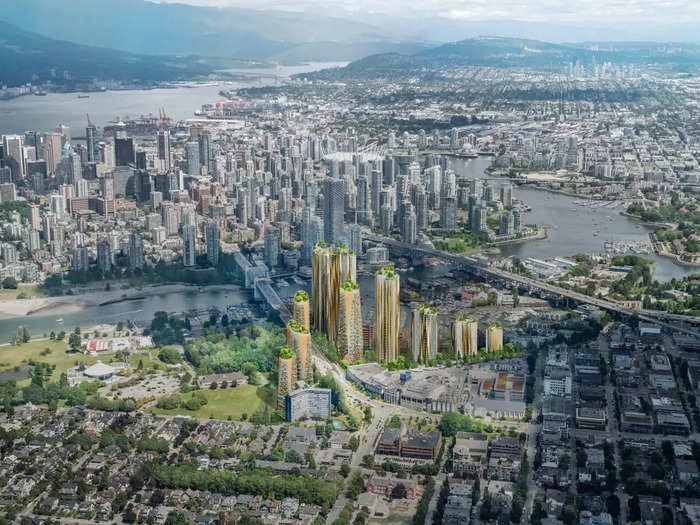
The Sen̓áḵw development in central VancouverCourtesy of the Squamish Nation
Canada's First Nations are breaking new ground with several major housing developments in the city of Vancouver.
Like the US, Canada is facing a severe housing affordability crisis, in large part driven by a shortage of homes — and Vancouver has some of the highest housing costs in the country. These projects represent major strides in addressing disproportionate housing burdens on Canada's Indigenous communities, as Business Insider recently reported, as well as efforts to build generational wealth for tribe members.
One project minutes away from downtown Vancouver, being built by the Squamish Nation, will include 11 towers and 6,000 housing units. The Nation won back the 12 acres of land the project sits on about 20 years ago after their ancestors were forced off the land in the early 20th century.
In another set of projects, three First Nations - the Musqueam, Squamish, and Tsleil-Waututh peoples - have come together to develop six pieces of land in Vancouver and its surroundings. Acquired over the past decade, the value of the land sits at $4 billion, according to Brennan Cook, vice president of the MST Development Corporation, the real-estate company representing the three First Nations.
"What they're doing here is groundbreaking, it really hasn't been done elsewhere," Cook recently told Business Insider.
Take a look at these projects and the future of housing in Vancouver.





Source: CBC News






Source: Vancouver.ca



Source: Vancouver.ca


 10 best kid-friendly summer vacation destinations in India
10 best kid-friendly summer vacation destinations in India
 “Are you accusing me of bullying the US?” jokes EAM S Jaishankar when asked about India-US relations
“Are you accusing me of bullying the US?” jokes EAM S Jaishankar when asked about India-US relations
 As rain and snow events become more intense, so could our earthquakes, study finds
As rain and snow events become more intense, so could our earthquakes, study finds

Copyright © 2024. Times Internet Limited. All rights reserved.For reprint rights. Times Syndication Service.